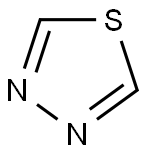
1,3,4-Thiadiazole
- Product Name1,3,4-Thiadiazole
- CAS289-06-5
- CBNumberCB9842733
- MFC2H2N2S
- MW86.12
- MDL NumberMFCD01311030
- MOL File289-06-5.mol
Chemical Properties
| Melting point | 42.5°C |
| Boiling point | 204°C |
| Density | 1.299 (estimate) |
| refractive index | 1.5300 (estimate) |
| form | solid |
| pka | -0.33±0.10(Predicted) |
| FDA UNII | 14IAC3GH7G |